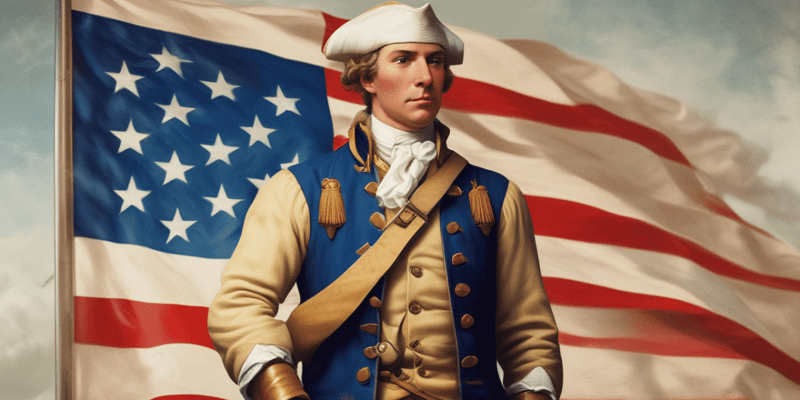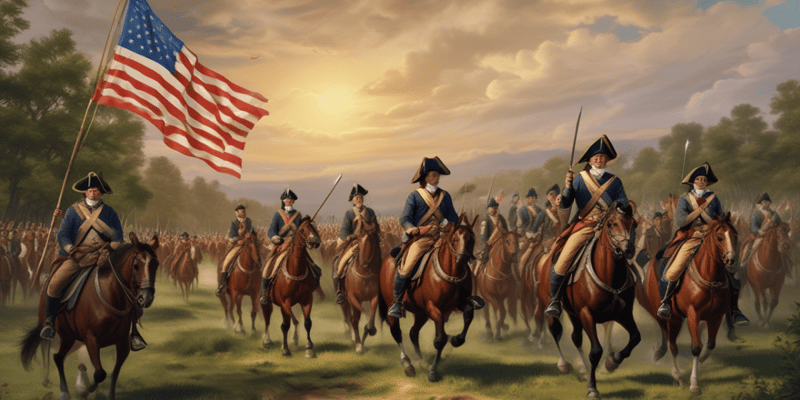26 Questions
What was the primary reason for the American colonists' objection to direct taxation?
It reduced their status as free men
What was the main purpose of the Proclamation of 1763?
To prevent conflict with Indian tribes in the Ohio Valley
How did the British government plan to pay its debts from the Seven Years War?
By raising revenue through new taxes and tariffs
What was a significant difference in property ownership between England and the American colonies?
Property ownership was more widespread in the colonies
What was the significance of the Seven Years War to the American colonists?
It led to the imposition of new taxes and restrictions by the British government
Why did the British government pass laws requiring American colonists to pay British merchants with gold and silver?
To standardize trade practices across the empire
What was the colonists' attitude towards being British citizens before the American Revolution?
They were proud to be British citizens
What was the colonists' expectation after the Seven Years War?
To be allowed to settle on land west of the Appalachian Mountains
What was the response of Parliament to the colonial defiance in 1774?
Passing the Coercive Acts
What was the purpose of the First Continental Congress?
To create a unified opposition to Great Britain
Who drafted the Declaration of Independence?
Thomas Jefferson
What was the main argument made by Thomas Jefferson in the Declaration of Independence?
That government derives its power from the consent of the governed
What was the significance of the Declaration of Causes?
It outlined the colonies' reasons for rebellion against Britain
What was the response of the colonies to the British monarch's abuse of power?
They wished to establish a new rule
What was the significance of the skirmishes at Lexington and Concord?
They marked the beginning of the American Revolutionary War
What was one of the grievances listed by Jefferson in the Declaration of Independence?
The British monarch had established an absolute tyranny over the colonies
What was enshrined in both the Magna Carta and the English Bill of Rights?
The right of the people or their representatives to consent to taxation
Why did the North American colonists object to taxation by the British Parliament?
Because they were not allowed to elect representatives to the British Parliament
What was the first tax to draw the ire of the North American colonists?
The Stamp Act
What was the result of the British officials' response to the Massachusetts legislature's petition for relief from the taxes?
The British government threatened to suspend the legislatures of colonies that engaged in a boycott
What event occurred on the evening of March 5, 1770?
The Boston Massacre
What was the main reason behind the Boston Tea Party?
To protest the British government's granting of a monopoly on tea to the British East India Company
What was the British East India Company?
A British merchant company that dominated the tea trade
What was the consequence of the Boston Massacre?
Resistance to British rule grew, especially in the colony of Massachusetts
What is the significance of Crispus Attucks in the context of the Boston Massacre?
He was an African American who was one of the first to die in the Boston Massacre
What is the connection between the Boston Tea Party and the modern Tea Party movement?
They both represented the same spirit of resistance to government's interference with people's rights
Study Notes
The American Revolution
- The American Revolution began when a small group of colonists felt that the king and Parliament were abusing them and depriving them of their rights.
- By 1776, the colonists had been living under British rule for over a century, with a degree of benign neglect, and each colony had established its own legislature.
- Taxes imposed by England were low, and property ownership was more widespread than in England.
The Proclamation of 1763
- After the Seven Years War, the British government passed the Proclamation of 1763, which forbade the colonists to purchase land or settle west of the Appalachian Mountains.
- This was done to prevent conflict with Indian tribes in the Ohio Valley.
The British Government's Need for Revenue
- To pay its debts from the war and maintain troops, the British government had to raise revenue.
- Acts passed by Parliament included laws requiring American colonists to pay British merchants with gold and silver, and a mandate that suspected smugglers be tried in vice-admiralty courts without jury trials.
Direct Taxation
- The imposition of direct taxes, such as the Stamp Act, angered the colonists, who felt that it reduced their status as free men.
- The colonists had not consented to direct taxation, and they argued that it was a violation of their rights as English subjects.
The Stamp Act
- The Stamp Act, passed in 1765, required that almost all paper goods have revenue stamps placed on them.
- The outcry was so great that the tax was quickly withdrawn, but it was soon followed by other tax acts, such as the Townshend Acts.
The Townshend Acts
- The Townshend Acts, passed in 1767, imposed taxes on everyday objects such as glass, tea, and paint.
- The taxes were poorly received by the colonists, and the Massachusetts legislature sent a petition to the king asking for relief.
The Boston Massacre
- In 1770, British soldiers fired into a crowd, killing three people, in an event that became known as the Boston Massacre.
- The event sparked resistance to British rule, especially in Massachusetts.
The Boston Tea Party
- In December 1773, a group of Boston men boarded a ship and threw its cargo of tea into the water to protest British policies.
- This act of defiance became known as the Boston Tea Party.
The Coercive Acts
- In response to the Boston Tea Party, Parliament passed the Coercive Acts, which punished Boston and interfered with the colony's ability to govern itself.
- The acts enraged people throughout the colonies, leading to the formation of the First Continental Congress.
The Declaration of Independence
- On July 2, 1776, the Continental Congress declared American independence from Britain.
- The Declaration of Independence, drafted by Thomas Jefferson, officially proclaimed the colonies' separation from Britain and listed the reasons for rebellion.
- The document eloquently laid out the reasons for rebellion, including the king's deprivation of the colonists' rights and his establishment of an absolute tyranny over the states.
Test your knowledge about the causes of the American Revolution, from colonial rights to British rule.
Make Your Own Quizzes and Flashcards
Convert your notes into interactive study material.
Get started for free



